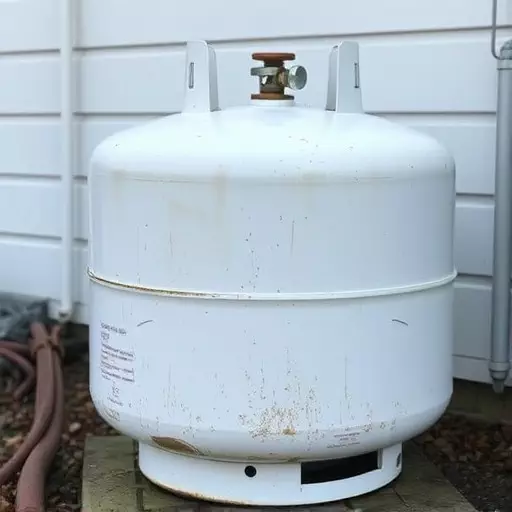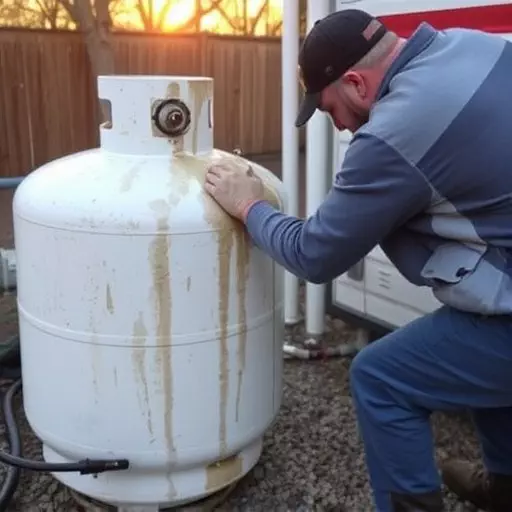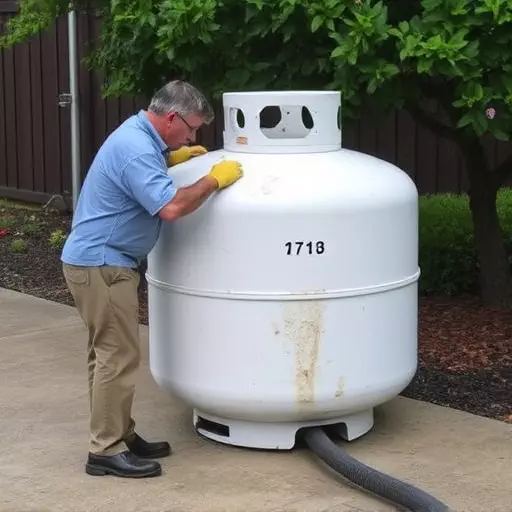Proper recreational propane tank maintenance in Camden, New Jersey is crucial for safety and longevity. This involves regular cleaning to remove debris, flushing with recommended solutions, and inspecting for damage like rust, leaks, or structural issues. Always follow manufacturer guidelines and local regulations to ensure accurate readings, prevent contamination, and maintain the tank’s structural integrity.
In today’s outdoor leisure landscape, recreational propane tanks are essential for heating, cooking, and powering appliances during camping trips and off-grid adventures. To ensure optimal performance and safety, proper maintenance of these tanks is crucial. This comprehensive guide delves into the intricacies of recreational propane tank maintenance in Camden, New Jersey, covering everything from understanding basic care to local regulations. Learn about effective cleaning techniques, thorough inspection methods for potential damage, and a step-by-step approach to keeping your propane tanks in top condition.
- Understanding Recreational Propane Tank Maintenance
- The Importance of Proper Cleaning Techniques
- Inspecting Tanks for Potential Damage
- Step-by-Step Guide to Storage Tank Maintenance
- Camden, New Jersey: Local Regulations and Best Practices
Understanding Recreational Propane Tank Maintenance

Proper recreational propane tank maintenance is an essential aspect of ensuring safety and extending the lifespan of your tank in Camden, New Jersey. This involves a combination of regular cleaning and thorough inspections to detect any damage or corrosion.
When it comes to cleaning recreational propane tanks, it’s crucial to follow specific guidelines. Proper cleaning includes removing any debris or sediment buildup inside the tank, as well as flushing with appropriate cleaning solutions recommended by manufacturers. Inspecting the tank for damage is equally vital; look for signs of rust, leaks, or any structural integrity issues that could compromise safety. Regularly examining valve connections and pressure relief devices is also part of maintaining a recreational propane tank to prevent potential hazards.
The Importance of Proper Cleaning Techniques

Maintaining your recreational propane tank is crucial, especially when stored for extended periods. One of the most vital aspects of this process is adopting proper cleaning techniques to ensure safety and efficiency. In areas like Camden, New Jersey, where outdoor recreation thrives, regular cleaning can prevent sediment buildup inside tanks. This is essential as dirty tanks can lead to inaccurate fuel readings, potential contamination, and even damage to your equipment when in use.
Inspecting the tank for any signs of damage before cleaning is a critical step. Look out for rust, leaks, or dents, as these could indicate structural integrity issues. Proper cleaning involves removing any debris or contaminants from the tank’s interior using suitable cleaning solutions. Always follow manufacturer guidelines and recommended safety protocols to avoid any hazards associated with propane tanks.
Inspecting Tanks for Potential Damage

Regularly inspecting your recreational propane tank is an essential part of responsible maintenance, especially in Camden, New Jersey, where outdoor activities thrive. Before each use, carefully examine the tank for any signs of damage or wear and tear. Propane tanks can sustain injuries from impact with sharp objects, extreme weather conditions, or even normal usage over time. Look for dents, cracks, rust, or leaks at the connections. These issues may indicate structural integrity compromise, which could lead to dangerous situations when filled with propane.
Proper cleaning is also crucial in preventing damage and ensuring optimal performance. Remove any debris or sediment that may have accumulated inside the tank during storage. Use recommended cleaning solutions and follow safety guidelines to avoid any potential hazards associated with propane. Regular inspections and thorough cleaning will not only prolong the life of your recreational propane tank but also guarantee safer use, especially when enjoying outdoor activities in Camden’s vibrant environment.
Step-by-Step Guide to Storage Tank Maintenance

Step-by-Step Guide to Storage Tank Maintenance
Proper storage tank maintenance is essential for recreational propane tanks, especially in areas like Camden, New Jersey where weather conditions can vary greatly. Before storing your tank, begin with a thorough cleaning to remove any debris or residues. Use a suitable cleaning solution designed for propane tanks and ensure all surfaces are rinsed thoroughly. This step is crucial as it prevents contamination and potential clogs. Next, inspect the tank for any signs of damage, including dents, rust, or leaks. Even small tears can lead to significant issues over time, so it’s important to catch them early. If any damage is found, address it promptly to ensure safety and prevent further complications.
After ensuring your recreational propane tank is clean and undamaged, it’s ready for storage. Place the tank in a secure, level area, away from direct sunlight or extreme temperatures. Make sure it is well-ventilated to avoid any buildup of gases that could be hazardous. Regularly inspect the tank during storage, checking for any signs of corrosion or moisture accumulation. Keeping a close eye on your propane tank will help maintain its integrity and guarantee safe usage when needed.
Camden, New Jersey: Local Regulations and Best Practices

In Camden, New Jersey, local regulations regarding recreational propane tank maintenance are stringent to ensure safety and environmental protection. It’s crucial to understand that proper cleaning and inspecting of these tanks is not just a best practice but also a legal requirement before refilling or redistributing them. Homeowners and businesses with stored propane tanks should regularly inspect for any signs of damage, corrosion, or leaks. This proactive approach helps prevent accidents and ensures the longevity of the tank.
For instance, Camden’s local guidelines explicitly mandate that recreational propane tanks undergo thorough cleaning to remove any buildup or debris before reuse. Inspecting the tank for damage involves checking for dents, cracks, or rust, which could compromise structural integrity. Following these best practices not only maintains the quality and safety of the propane but also aligns with local regulations, potentially avoiding fines or legal issues.


